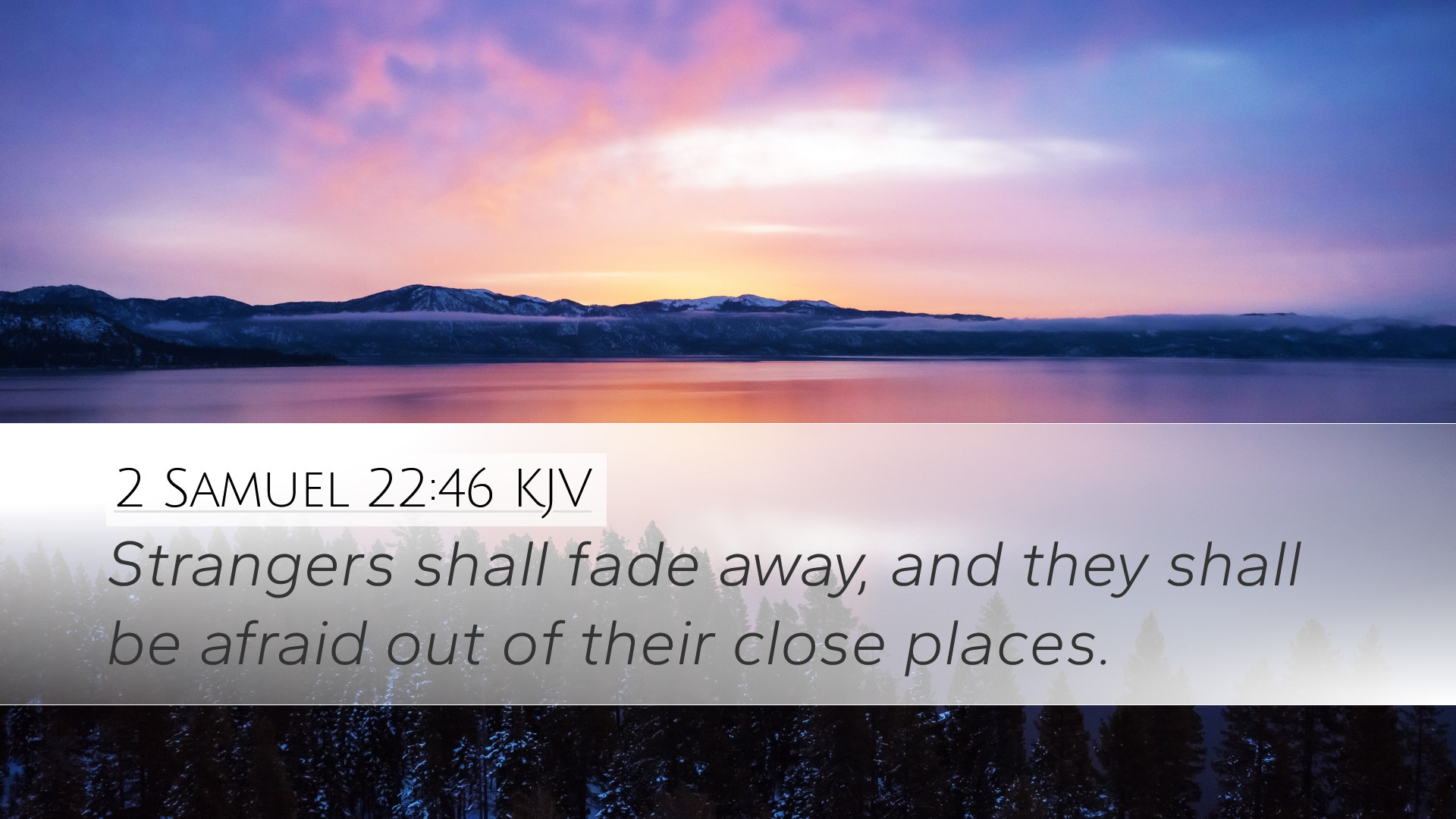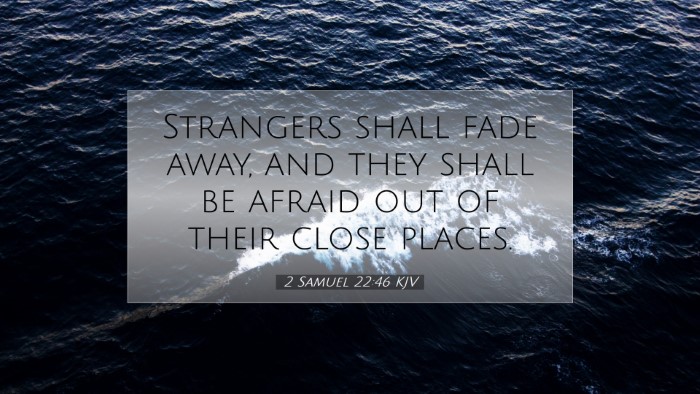Commentary on 2 Samuel 22:46
Verse Text: "Strangers shall fade away, and they shall be afraid out of their close places." (2 Samuel 22:46, KJV)
Contextual Overview
This verse occurs within a song of praise, attributed to David, after his deliverance from Saul and various enemies. The chapter culminates in a declaration of God’s faithfulness and strength, emphasizing His protective power over David and the covenant people of Israel.
Theological Significance
This verse reflects profound theological insights regarding divine protection and vindication. It highlights the contrast between the strength of God and the weakness of those who oppose His anointed.
Insights from Public Domain Commentaries
Matthew Henry’s Commentary
“Strangers shall fade away”, emphasizes the transient nature of those who stand against God's purposes. Henry points out that this fading represents not only the defeat of enemies but also their inability to endure against the presence of the Almighty. The term “strangers” signifies those who do not belong to God’s covenant, highlighting their ultimate failure when confronted by divine power.
Henry further notes that this verse reflects God's sovereignty, indicating that those who align themselves against His chosen ones are essentially strangers in a spiritual sense. The closing portion, "and they shall be afraid out of their close places," underscores the terror that envelops the adversaries when faced with God's judgment. These 'close places' may refer to their fortified positions or their hiding places, suggesting that no physical stronghold can shield them from divine retribution.
Albert Barnes' Notes
Barnes explains that "strangers" often refers to alien nations or unbelievers. He delves deeper into the implications of their fading—pointing out that the consequences are not merely physical defeat but spiritual consequence as well. Barnes states that "they shall be afraid" indicates the ultimate recognition of God’s authority over all creation, instilling fear in those who oppose Him. Even in their fortified places, the enemies of God cannot escape the awareness of His impending judgment.
He posits that this passage serves as a reassurance to believers of God's overarching protection and providence. The faithful can rest in the assurance that God’s justice will prevail, whether against adversaries seen or unseen.
Adam Clarke’s Commentary
Clarke offers a historical perspective, noting that the context of this declaration is deeply rooted in David’s own experiences. He exclaims that the narrative supports the Zionic themes—highlighting the covenant relationship between God and Israel. Clarke states, "Strangers shall fade away," denotes the inevitable downfall of adversaries when they rise against God’s people. Their strength crumbles much like chaff before the wind.
Furthermore, Clarke articulates that the fear experienced by these strangers is indicative of a divine principle: God’s enemies will retreat in terror as they recognize their standing before the creator. They may seek shelter in their strongholds, but God's presence is a consuming fire that dispels all who oppose His will. This notion speaks to the sovereignty and ultimate authority of God over nations and individuals alike.
Practical Applications
For pastors and theologians, this verse offers a rich foundation for sermons on God’s sovereignty and protection. It prompts discussions on how believers can find solace and strength in knowing that God defends them against their enemies. Furthermore, it challenges congregations to reflect on their own standing—are they firmly rooted in God’s promises, or are they akin to the strangers highlighted in this verse?
- Encouragement for the Afflicted: This verse is a reminder that those who oppose us will eventually fall away. Believers can find solace in God's unwavering support.
- Reflection on Identity: Understanding who we are in relation to God’s covenant can solidify our identity and purpose. We are not strangers but beloved children.
- Call to Prayer: Pastors should encourage their congregations to maintain a consistent prayer life, seeking God for protection and intervention against adversaries.
- Emphasis on God’s Justice: This passage can lead to discussions on the nature of justice and how God delivers His people from harm.
Conclusion
2 Samuel 22:46 encapsulates the dual themes of God’s protection and the fate of those opposed to Him. Through insights shared by esteemed commentators such as Matthew Henry, Albert Barnes, and Adam Clarke, it becomes evident that this verse serves not only as a historical reflection of David’s experiences but also as a timeless promise for believers today. As we face adversities, let us remember the fading of strangers—enemies of God—whose fear underscores the might of the Lord. The call to strengthen our faith and trust in God becomes paramount as we meditate upon this powerful message.


